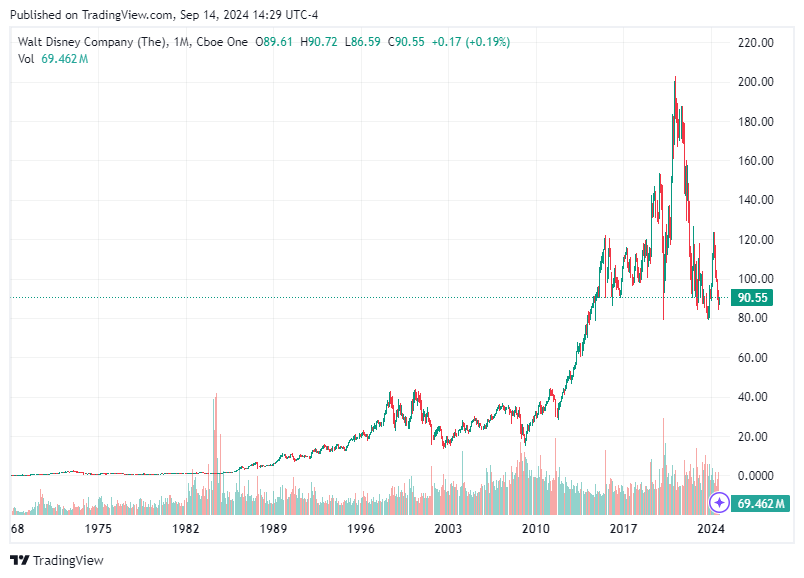DirecTV and Disney Settle Major Dispute
Navigating the Storm: DirecTV and Disney Resolve Channel Dispute.

Disclaimer: This article is intended for informational purposes only and does not constitute legal or financial advice.
We are working endlessly to provide free insights on the stock market every day, and greatly appreciate those who are paid members supporting the development of the Stock Region mobile application. Stock Region offers daily stock and option signals, watchlists, earnings reports, technical and fundamental analysis reports, virtual meetings, learning opportunities, analyst upgrades and downgrades, catalyst reports, in-person events, and access to our private network of investors for paid members as an addition to being an early investor in Stock Region. We recommend all readers to urgently activate their membership before reaching full member capacity (500) to be eligible for the upcoming revenue distribution program. Memberships now available at https://stockregion.net
DirecTV and Disney have reached a resolution to their nearly two-week-long dispute. This disagreement, which led to a blackout of Disney-owned channels including ESPN and ABC, affected approximately 11 million DirecTV subscribers across the United States. As service is restored, viewers regain access to a vital part of their entertainment lineup, just in time for major sports events and award shows.
The Dispute: A Brief Overview
The conflict between DirecTV and Disney began on September 1, 2023, when negotiations over distribution terms hit an impasse. As a result, several Disney-owned channels were pulled from DirecTV's service. The affected networks included ABC stations in major cities and various Disney networks such as ESPN, Freeform, and FX. This blackout deprived subscribers of access to popular programming, including the early weeks of college football, the NFL's Monday Night Football, and the US Open.
At the heart of the disagreement were contract terms related to channel bundling and the cost structure for carrying Disney's content. DirecTV, like many service providers, is navigating the complex landscape of traditional cable services amid growing competition from streaming platforms. Disney, a major player in both traditional and digital media, sought terms that would reflect its robust content offerings. This standoff reflects broader challenges within the industry as media companies and service providers negotiate how to balance consumer preferences, technological advancements, and economic considerations.
The blackout's impact on DirecTV's subscribers was immediate and multifaceted. Sports enthusiasts, in particular, found themselves without access to key games and events. The timing of the blackout coincided with the start of the college football season, a period of high viewership for ESPN. Additionally, the blackout affected viewership of the US Open and the NFL's Monday Night Football, events that traditionally draw significant audiences. The absence of these channels disrupted the viewing habits of many subscribers, leading to frustration and uncertainty. The blackout also highlighted the ongoing tension between content providers and distributors, as both navigate the evolving landscape of media consumption.
The New Agreement: Key Terms and Developments
On September 13, 2023, DirecTV and Disney announced they had reached a new long-term agreement that would restore the blacked-out channels. While the detailed terms of the agreement have not been fully disclosed, several key elements have been made public.
First, the deal allows DirecTV to offer Disney+, Hulu, and ESPN+ as part of certain packages, expanding the range of content available to subscribers. DirecTV will provide ESPN's upcoming streaming service at no extra cost, a strategic move that addresses the increasing demand for flexible viewing options. The agreement includes the creation of specific "skinny" bundles related to Disney networks. These bundles, which offer genre-specific content such as sports, entertainment, and family programming, represent a tailored approach to content delivery, reflecting consumer demand for more personalized viewing experiences. This flexibility was a critical point in negotiations, as DirecTV sought to offer more customized options to its customers.
The Industry
One key problem is the growing importance of streaming services in the media ecosystem. The integration of Disney's streaming platforms into DirecTV's offerings reflects a broader trend towards convergence between traditional and digital media. This trend is driven by consumer demand for flexibility and convenience in how they access content. As service providers and content creators navigate an increasingly competitive market, the ability to offer diverse, customizable packages will be crucial. This shift towards more tailored offerings aligns with broader consumer trends favoring on-demand and personalized experiences.
Finally, the DirecTV-Disney agreement highlights the ongoing negotiation challenges within the industry. As content creators and distributors seek to balance economic considerations with consumer demands, disputes like this may become more common. However, they also present opportunities for innovation and collaboration, ultimately benefiting consumers and the industry as a whole.
The resolution of the dispute between DirecTV and Disney marks an important moment in the ongoing evolution of the media industry. By reaching a new agreement, both companies have addressed subscriber concerns and adapted to changing market dynamics. As subscribers regain access to a wealth of content just in time for major sports events and award shows, the industry is reminded of the need for flexibility, innovation, and collaboration in the face of evolving consumer preferences and technological advancements.
Disclaimer: This article is intended for informational purposes only and does not constitute legal or financial advice.


